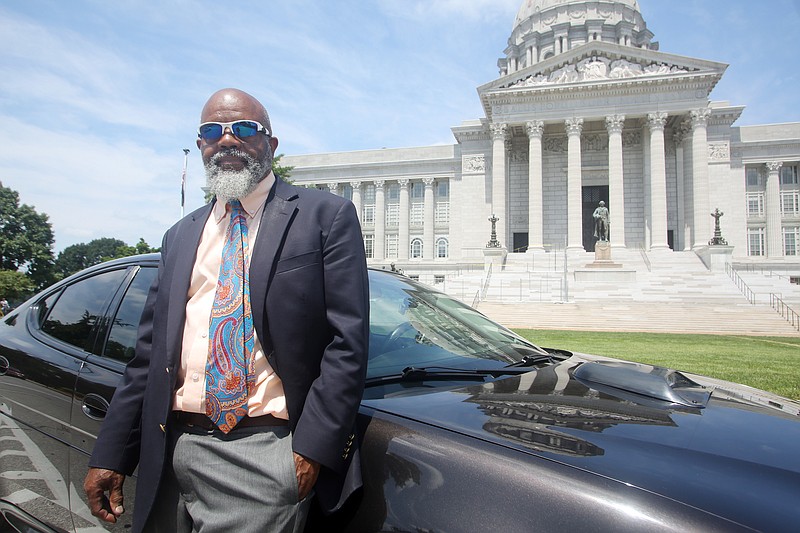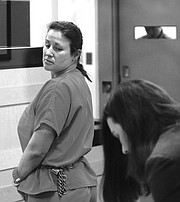At 12:48 a.m. on a stormy Friday, Gerry Mack sets out mining for gold.
"Ping, ping, ping," his smartphone dings, each one putting a twinkle in Mack's eyes as he zigzags across Columbia.
The Jefferson City resident drives for Uber. As lightning lit up the sky and rain pelted the windshield, Mack made this late-night excursion to Columbia partly out of boredom and partly because he loves searching for extra cash hidden on street corners.
Mack is part of a labor market trend characterized by a prevalence of short-term contracts or freelance work instead of permanent jobs. As the "gig economy" expands past the boundaries of Silicon Valley and into smaller towns like Jefferson City, it's giving freelancers like Mack the flexibility to work whenever they want, wherever they want and for whomever they want.
Gov. Eric Greitens signed legislation April 24 allowing ride-hailing services like Uber and its smaller competitor Lyft to begin operating freely in Missouri. Uber began service in Jefferson City about a half-hour after Greitens signed the bill; Lyft followed five days later.
Mack's 2000 Pontiac Grand Prix has 198,000 miles on it. Rolling toward each of Mack's stops, the car rumbles and shakes and feels like it's belching.
Since he started driving for Uber two years ago, he's serviced more than 3,000 fares. Many weekends, especially during the school year, he'll drive to Columbia to ferry around college students.
On this night, he wears gray slacks, a white dress shirt, a blue sport coat and blue tie. Smooth jazz hums on the CD player, creating the impression for customers that they're in a high-end cab - even when they're in the back of a beat-up Pontiac.
Three minutes into his night, his phone buzzes for the first time. At 12:55 a.m., he picks up his first rider on a street corner downtown. A man in his early 20s stumbles into the back seat and speaks words that sound like they came from an alien language.
"You want to request another Uber maybe?" Mack told him as he kicked the rider out of the car because the drunken man cursed at Mack.
The experience isn't typical, he said.
"It's a little frightening at first," Mack said. "It's new, but you don't really meet anybody dangerous. You just meet regular people."
Last November, the Pew Research Center found a small but significant portion of Americans, like Mack, worked in the gig economy. According to Pew, 8 percent of the U.S. population earned money over the past year using digital platforms to take a job or task. The center also found 24 percent of Americans earned money from the "platform economy" over the past year when including people who earned money by selling goods online and people who rent out their homes to strangers with apps.
More than anything, participants in the gig economy often do so simply to pass the time. Forty-two percent of respondents to Pew's survey said gig economy jobs give them something fun to do in their free time. Thirty-seven percent said gig jobs fill gaps in their income. Thirty percent of respondents also said they like that gig economy jobs let them set their own hours.
Unmarried and without children, Mack often finds himself on these solitary late-night excursions, usually on weeknights. He talks with an intense reverence about driving for Uber as if he's playing a sport - saying during the best weeks, when he pushes himself, he can make up to $1,000 and drive 100 trips.
At age 58, he considers himself a workaholic. From 3:30-11:30 p.m. each weekday, Mack works full time at the ABB factory in Jefferson City, where he's worked for 26 years. He's worked other part-time jobs around the area through the decades but likes this one the best.
Mack doesn't need to drive for Uber. He just enjoys being there, serving people who need him.
"I have a very good job at ABB," he said. "Uber is a good thing because it takes a lot of drunk drivers off the road."
He's curious about his riders and enjoys the social aspect of the gig.
"You meet (lots) of people," Mack said. "And you can make money while you're doing it. It's not a bad deal."
Uber spokeswoman Charity Jackson said she's spoken with many drivers who tell her this is a benefit of the job.
"It's an exciting way to get to know the people that live in your community," Jackson said.
On this night, all of his riders were University of Missouri students decades younger than he. Still, at times, many seem just as curious about him as he was about them. Most riders ask about driving. One asks about his job. Other times, the conversation turns toward the safety of Columbia neighborhoods and student apartment complexes. One rider, who told Mack she was high on Xanax, even asks for a stick of gum, which Mack then produced.
By 3 a.m., after five trips and about a dozen riders, Mack heads back to Jefferson City. Some nights, after the rush from the bar crowd dies down, he'll find a place to sleep while he waits and prays for his phone to ping and experience the gold rush one last time.
As he drops off his final passenger and the pitter-patter of the rain on the roof starts to slow, Mack uses the Uber app to add up his earnings for the night. After two and a half hours of work, he's made about $43. Mack does not let slow nights dissuade him, though. The next night, he planned to drive tourists around the Lake of the Ozarks because he's always driving off into the night.
The problem with Jeff City right now is people don't open up their minds to new things, so it doesn't grow well."
'A technological evolution'
Gig economy jobs exist in varying forms in Jefferson City and worldwide, but researchers often have trouble defining what and who actually comprise them. Most researchers agree the gig economy is an offshoot of the freelance economy. It also exacerbates America's shift from manufacturing jobs to service jobs.
"These platforms represent a technological evolution tied to the ongoing labor force shift towards freelance and independent contracting," according to Pew's recent study.
A key characteristic of the gig economy is it makes it easier to connect customers to people looking for freelance or piecemeal jobs.
Mr. Delivery, a startup that hires drivers to deliver food from a restaurant to customers, delivers food from about a dozen Jefferson City restaurants. Joel Marr, Mr. Delivery's market manager in Columbia, said the company sees its drivers as small-business owners.
"I wouldn't call it freelancing," Marr said. "Really, we provide them with the technology to run their small business."
When a customer orders from Mr. Delivery, the company charges a $5 delivery fee. Of that, $3 goes to the driver and $2 goes to the company, which Marr said is used to cover the cost of things like technology that connects the company to the driver. Drivers also earn tips.
Drivers schedule their own hours on an app, but this setup does have drawbacks. Even though drivers set their own hours, they still sometimes have trouble showing up for shifts, Marr said.
"I wish I was joking," he said. "Their car breaks down nine times out of 10. Or they forgot and go to a social event."
Some Jefferson City residents rent out their homes through platforms like Airbnb. That company said 64 properties were listed for rent in the Jefferson City area in late June. During dates surrounding the Aug. 21 solar eclipse, all rentals in the Capital City appear to be booked.
Kathrine Reed, Jefferson City Convention & Visitors Bureau communications manager, said the bureau hears anecdotal stories about people renting rooms or houses locally through Airbnb. But the bureau doesn't track that information because it doesn't receive income from the lodging tax levied on hotels, as it is not levied on person-to-person rentals.
These sites are vastly different from Mountain View, California-based Upwork, which connects freelance designers, programmers and writers to companies.
Uber and Lyft rarely give driver counts and revenue data. Jackson and Lyft spokesman Scott Coriell declined to say how many drivers either company has in Jefferson City. Coriell said 700,000 people drive for Lyft nationwide, and Jackson said "hundreds of thousands" of people drive for Uber nationwide.
By all accounts from drivers reached by the News Tribune and on social media, Uber and Lyft are off to slow starts in Jefferson City. Mack said the city is just slow to change, but he thinks traffic will pick up eventually. In Jefferson City, he gives most rides to blind people, he said.
"The problem with Jeff City right now is people don't open up their minds to new things, so it doesn't grow well," Mack said.
Jackson said Uber was pleased with its statewide launch in Missouri.
These guys are basically filing their taxes like they're a small-business owner."
Uncle Sam's cut
The legal status of these employees remains murky, as courts in the United States and abroad continue to haggle over whether gig workers are employees or contractors. Pew reported 66 percent of customers viewed ride-hailing service drivers as independent contractors. Similarly, 68 percent of workers in the gig economy see themselves as contractors.
Last May, Uber, which calls its drivers "driver-partners," agreed to pay $100 million to parties in two California lawsuits but kept the status of its drivers as contractors in the United States. In October, a London court ruled drivers are employees under British law.
For now, gig workers are mired in a confusing tax system unprepared for the digital age. Because gig workers lack any single IRS classification, the ways workers file taxes often vary from company to company. The IRS website offers gig workers guidance on how to file taxes but does not issue specific guidelines because of the numerous gig jobs and ways they vary. Generally, contractors working for gig companies receive a tax form from every company that paid them more than $600.
Since Uber considers drivers independent contractors, it sends its drivers tax Form 1099 in lieu of traditional W-2 forms. W-2s list wages paid to employees and taxes withheld by the company. Under the contractor arrangement, the employee is responsible for reporting and paying all taxes.
Online tax preparation site TurboTax says on its website that Uber drivers will see all the money the company collected from the customer. "This will be more than you actually received in payment, since it includes the ride-share company's commissions and other expenses," the website notes.
Uber and Lyft issue contractors Form 1099-K tax forms because it tracks all income paid by credit and debit cards to a contractor. Other companies, depending on the type of work, may issue the Form 1099-MISC.
Mr. Delivery drivers file a Schedule E form. People use this form to report supplemental income from real estate rentals, S corporations and trusts.
"These guys are basically filing their taxes like they're a small-business owner," Marr said.
People who use their vehicles more than half the time for business may also deduct the cost of maintenance, gas mileage and the actual cost to operate the vehicle from their taxes. People who rent their home or apartment for less than 14 days aren't required to pay taxes on income earned.
Gig companies generally do not give benefits like health care to contractors, while individuals have been required to have health insurance since 2014.
I thought if we can make it work here, then we can make it work elsewhere."
A small-town opportunity?
Here, in small-town America, a San Francisco entrepreneur sees opportunity. He sees the opportunity to prove his business can work and prove to backers they should invest in him.
Rolla native AJ Shrestha recently moved back to Mid-Missouri to launch his pet project Kwik Dish. The web app allows users to order meals from restaurants or home cooks. The app launched June 26 in Jefferson City and Columbia.
Kwik Dish offers lunches for pickup from home cooks and local restaurants for now. Meals range from $6-$9 each, with higher-priced meals being more exotic fare. Dishes emphasize authentic, healthy food, Shrestha said.
Home cooks will expand food offerings available in each city and give cooks some extra money, he said. Shrestha also hopes restaurants that partner with Kwik Dish will see an increase in foot traffic.
Before its launch, Kwik Dish raised about $100,000 in funding. Late last month, Shrestha made a pilgrimage back to Silicon Valley to hawk his company to investors.
Startups generally run pretty lean. Shrestha put much of his own money into the project and does not take a salary now. Here, Kwik Dish stands out to investors in ways it might not in larger markets, he said.
"The capital that you use has to be allocated properly, and the last thing you want to do is fight to get a little attention," Shrestha said. "That's usually what you have to do in New York City and San Francisco because everybody's at the dance."
Shrestha thinks Kwik Dish can work in small and large markets. But he believes he could use this area and its relatively small population to prove to investors that the idea can work on a larger scale.
"If you can find a place where you can test your idea and let the idea have traction in small towns, it makes more sense to come to a place where there's not a lot of people trying to do the same things," Shrestha said.
"I thought if we can make it work here, then we can make it work elsewhere."
Read the full July 24, 2017, edition of #jcmo Inside Business:




